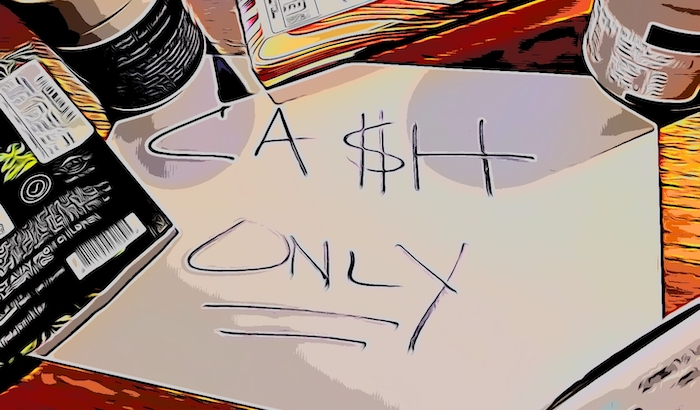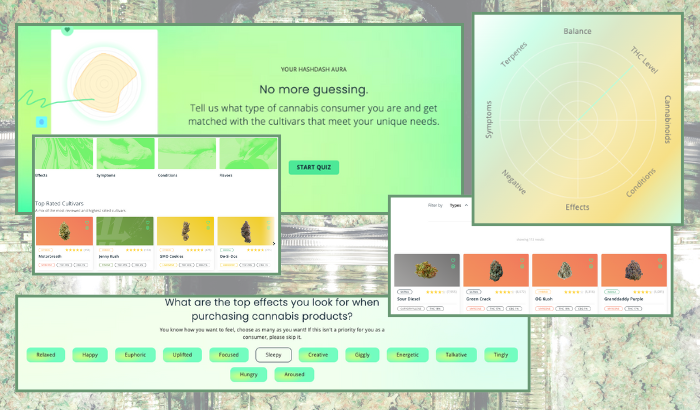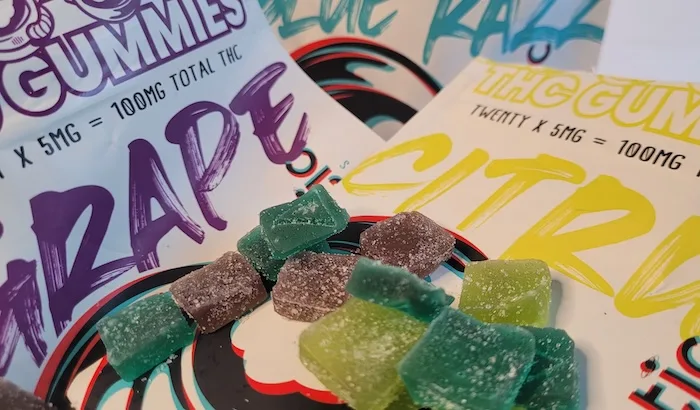
“That’s why we have always steered our cannabis clients to compliant payment platforms.”
Don’t be fooled by the headline. The smell of money in a weed store is not good news.
This week, Tiffany Kary of Bloomberg Law reported that card networks are finally shutting down the ability of cannabis stores to accept ATM cards for payments. This process is referred to as cashless ATMs and for the uninitiated it can be an odd and confusing issue. Today we dive into what it is all about and how it could reverberate through the retail landscape of the cannabis industry.
The ATMs
When a customer visits an automated teller machine (ATM) to withdraw money, they insert their bank card and after the transaction concludes, leave with the specified withdrawal, in cash.
In a cashless ATM, the pin pad and card insertion device are present, but there is no cash dispenser. The customer inserts their card, enters their pin, selects a dollar amount (let’s assume $60) which is ultimately transferred to the retailer, and at the same time purchases (as an example) $53.80 of cannabis. The retailer hands over the product and pays the customer $6.20 in cash.
From an accounting perspective, the customer sees nothing amiss. In a conventional setting, they would have received $60 from the ATM, paid the retailer for their product, and left with $6.20 in change. In a cashless setting, the numbers are the same.
For a retailer, the $60 is electronically deposited to their depository account. The problem is that the transaction is considered bank fraud and the $6.20 of change paid to the consumer is money laundering. That is the big rub most people do not understand—but we will break it down to explain the underlying logic.
A unique industry
Through more than 40 years of finance and consulting experience, I have heard many people explain why their industry isn’t like the rest. The truth is that every industry has its uniqueness but overall, business is business.
What makes cannabis different is that it is illegal at the federal level, legal at the state level, and tolerated by the feds through a series of non-legislative memoranda known as guidance memos. These memos are akin to saying, We can’t change the law for you, but if you do this, here’s how we want it done.
That is how the cannabis industry operates. These memos provide regulatory guidance on how the government wants you to treat this industry until the feds take steps to correct the inconsistencies between existing federal legislation and the new cannabis industries protected by state legislation and regulation. The most famous guidance memos are the three Cole memos, with the final one issued on Feb. 14, 2014, the same day the US Treasury’s Financial Crimes Enforcement Network (FinCEN) issued guidance on cannabis business banking.
SARs
In a COVID-focused world, SARS stands for Severe Acute Respiratory Syndrome. In banking, the acronym means Suspicious Activity Report(s).
The purpose of Suspicious Activity Reports is to report known or suspected violations of law or suspicious activity observed by financial institutions subject to the regulations of the Bank Secrecy Act (BSA). The 2014 FinCEN memo sets forth the reporting requirements. In short summary, financial institutions, like banks, credit unions, and payment processors, are to file SARs whenever required, but if the incident is arising from a state-licensed cannabis operator and appears to follow state laws, the reporting institution files a “Marijuana Limited” SAR report.
All cash from state-legal cannabis operations may be considered trafficking proceeds federally because marijuana is listed on the Controlled Substances Act as a Schedule I controlled substance.
When state-legal marijuana trafficking proceeds are deposited to a regulated financial institution together with a Marijuana Limited SAR, the funds are legitimately allowed back into the US financial system.
When a cannabis retailer accepts a cashless ATM card for payment, the funds are directly deposited to the retailer’s deposit account. Furthermore, what gets deposited is the full ATM withdrawal ($60 in our example), and the $6.20 of change is returned to the customer in cash. Disguising the purchase as an ATM transaction through miscoding is fraud. The payment processors that use this method are also stealing services from the financial institutions by violating the terms of their access. The cannabis retailer returning the $6.20 to the customer is laundering money — taking drug trafficking proceeds (the $6.20 came from a prior customer who paid cash for their purchase) and paying it to a third party (the cashless ATM customer) without any notice to the government (the SAR report).
Furthermore, the cashless ATM cannabis businesses have to lie to their own financial institution through their records to get them to accept the miscoded funds into their bank accounts, furthering the depth of the money-laundering web.
Turning a blind eye
Desperate for a consumer electronic payment system, cannabis operators turned to questionable vendors who recycled old solutions from the 1990s designed to trick or thwart government financial regulations. With networks (VISA, Mastercard, AMEX, Discover) unwilling to process cannabis purchases, shrewd operators began to disguise their operations, using dummy names or washing their card transactions through shell vendors.
In June 2021, a Manhattan federal judge sentenced two former consultants for Eaze Technologies Inc. to 30 and 15 months, respectively, for conspiracy to commit bank fraud in their roles in a scheme to dupe US banks into handling more than $150 million in credit card payments for Eaze as payments to other sham retailers between 2016 and 2019. Eaze’s former CEO, James Patterson, pleaded guilty to conspiracy to commit bank fraud in the case prior to the trial.
Aside from sham vendors, some cannabis payment vendors began to use crypto currency to accept the funds while others utilized the cashless ATM scheme. After Visa became aware of the cashless ATM scheme, it issued a compliance memo to its customers on Dec. 2, 2021 warning that miscoding point-of-sale transactions as ATM withdrawals, when in fact the transaction was a purchase, could lead to penalties or other unspecified enforcement action.
“Cashless ATMs are POS devices driven by payment applications that mimic standalone ATMs. However, no cash disbursements are made to cardholders,” the memo explains. “Instead, the devices are used for purchase transactions, which are miscoded as ATM cash disbursements. Purchase amounts are often rounded up to create the appearance of a cash disbursement.”
Cannabis executives didn’t seem to care, scoffing at the idea that anything could happen. After all, everyone was doing it.
In April 2022, Bloomberg reported that cashless ATM-type “transactions looked likely to move about $7 billion past the usual money-laundering controls of the banking system this year—or about a quarter of all US cannabis sales.”
The lonely road
Despite statistics that show cannabis is a male-dominated business, the industry does boast many spectacularly intelligent women including Ashley Elsner, a Yale graduate, finance and business lawyer, and Kellogg MBA in finance, and Cathy Corby Iannuzzelli, a Columbia Business School MBA with numerous stints as a senior-level executive within the card industry. They each developed a compliant payment platform: Elsner with Artery Pay, and Corby Iannuzzelli with KindTap.
Artery Pay applied novel compliance systems and practices to manage high risk industry payments compliantly. The company exited cannabis earlier this year, and was subsequently acquired by an eCom provider for its AI-driven technical solutions. Those solutions streamline and automate the required anti-fraud and anti-money laundering reporting process, reducing the workload on oft-overburdened trained compliance professionals. Financial institutions, such as banks and credit unions, loved her compliance-based approach to cannabis payments and Artery Pay was named a Benzinga Listmaker for both Best Payments App and Best Use of Blockchain in 2020.
However, cannabis industry executives were insistent on services that accessed what customers already had in their wallets, despite the risks. During her time supporting the cannabis industry, Elsner, known for her ability to predict and explain financial market behavior and reactions after her predictions in 2017 related to Eaze’s credit card processing came true, was stunned watching the ostriches put their heads in the sand, as executives from some of the largest cannabis companies ignored the Visa warning and believed no harm could come. Instead, they simply increased their exposure to cashless ATMs as they expanded into other states and opened more dispensaries, arguing that it was all bluster as the card networks would never want to forgo the lucrative fees being earned on the cashless ATM networks. According to Bloomberg, last April Curaleaf stated “that it processes around a third of its transactions through cashless ATMs.”
Bewildered by the unwillingness to face facts about the cashless ATM reality, Elsner warned that retailers were outsizing their business risk exposure by using cashless ATMs and when caught, were likely to be blacklisted by the US financial industry for banking, payments, and any other financial services their growing businesses will need once cannabis is legal and accepted. Those merchants on the blacklist would be at a disadvantage because they would likely be unable to obtain financial services on reasonable terms or possibly at all within the US.
Further, Elsner expressed concerns that the use of these systems could lead to shareholder lawsuits as well as other possible legal consequences for the business and managers, as it did in the Eaze “payments consultants” case.
We contacted Elsner, who, speaking on her own behalf, said, “Artery Pay didn’t use any tricks; we just did the work of building relationships within the financial space based on trust with everyone knowing that we were processing cannabis payments and making sure that we followed financial laws, regulations, and our agreements with our financial partners. The financial services sector is a heavily regulated industry. Any attempts to ‘work around’ the laws and regulations in the financial sector, including the contracts governing access, such as card network rules, are illegal. That’s why these responses from the financial sector are highly predictable. They are practically required.”
In September 2021, when Elsner was awarded Top Payments Leader at the Payments, Banking, and Cannabis Conference a few months prior to the Visa memo, she predicted that the cashless ATM market would be shut down within 18 months. Her timing was relatively spot on. As cannabis is not yet allowed over the card networks, only time will tell if her blacklist prediction is as accurate.
KindTap was able to forge ahead in cannabis and in April 2022 participated with other cannabis payment leaders in a webinar on Permissible Payments in Cannabis hosted by Frank A. Segall and Scott Moskol, the chairs of Cannabis Business Advisory Group of the law firm Burns & Levinson (with the recent crackdown, this webinar is now a must-watch for anyone trying to understand and identify the guardrails of retail payment methods in cannabis). It’s a fantastic primer on the pitfalls and risks of cashless ATMs and blockchain (crypto).
Even so, industry traction was dampened by cashless ATM vendors assuring clients that their system was legal. Cannabis executives apparently heard only what they wanted to hear. The coming crackdown might be opening their ears.
We reached out to Frank A. Segall who said, “This comes as no surprise.” He continued, “Burns & Levinson has been advising clients for several years that this could happen. Any payment platform and any dispensary utilizing those platforms that eventually touches the credit / debit card rails of major credit card companies or ATM rails with disguised transactions and merchant codes—like a customer’s debit card / bank statement that reads ‘Joe’s Sunglasses’ is violating the card network’s policies and procedures and runs the risk of enforcement and potentially being blacklisted in the future. That’s why we have always steered our cannabis clients to compliant payment platforms.”
Corby Iannuzzelli of KindTap reminded us that “certain bad actors have ended up in jail because of the miscoding of point of sale terminals. It has gone from being a murky area to being outright dangerous to flout the rules. Several bad actors convinced dispensaries that it’s OK, but the dispensaries are being told lies. That’s why I developed KindTap. We provide dispensaries with the ability to offer their customers consumer credit in a fully compliant manner.”
At an October 2022 cannabis conference in Edison, New Jersey, I was speaking with industry accountant Rick LaNeve of Accounting Buds when another vendor approached to discuss payment platforms for Rick’s clients. I asked whether the system was a cashless ATM and the vendor confirmed it was.
When I turned to Rick and advised him that the cashless ATMs were illegal and considered money laundering, the vendor tried to explain that theirs was not a cashless ATM but a PIN debit system. A PIN (personal identification number) debit card transaction is an electronic funds transfer from a customer’s bank to a merchant’s bank. It’s initiated when the customer presents a bank-issued payment card linked to his or her checking account (the debit card) and enters a password (the PIN) at the point of sale.
The problem is that the debit card networks will not knowingly allow a transfer to a cannabis merchant. The solution is to treat the PIN debit like a cashless ATM transaction (round up the amount and return the excess cash) or to disguise the actual merchant’s identity (aka Eaze, which landed several people in jail).
As LaNeve observed, “It’s always been shocking to me how many supposed ‘legal’ merchant service providers approach me at cannabis conferences pitching their solution, hopeful I will take it to all of our clients. But when I start to ask a few questions the legality of it quickly fades away with answers such as, Well, we only process transactions once a month so that the banks don’t catch on and similar answers that show that the providers know its fraudulent and illegal, but still have no problem walking up to someone and saying their solution is completely legit.
He continued, “At Accounting Buds we have been at the forefront of warning our clients, and really anyone that we talk to, about the fraudulent nature of cashless ATMs. We’ve talked almost all of our clients out of using them simply by asking them whether they want to risk being the person made an example of in the industry, and then referring them to the Eaze case. It was inevitable that the shoe that has now dropped was going to happen, especially after the Visa statement in December 2021.”
It is no secret that average sale amounts increase when customers pay with plastic. With a return to cash payments, many dispensaries will compound the revenue reductions being experienced due to falling prices of flower and general margin compression. The smell of money might not be a good thing in a weed store.

























